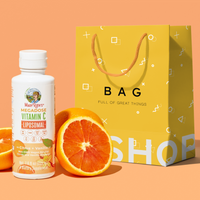FEATURED
BY COLLECTION
FIND MARYRUTH'S IN STORE!

STORE LOCATOR
Now you can find your all-time faves and discover some exciting new products while you're out shopping.
GET STARTEDVitamin B2, also known as riboflavin, is a vitamin that’s essential for your body. And while B2 is produced in the large intestine by some gut bacteria, the body cannot produce this vitamin on its own, and there are still recommended daily allowances.
Also important to note is that, like the other B vitamins, riboflavin is water-soluble. This means that your body doesn’t store it the same way it would a fat-soluble vitamin. Once absorbed, fat-soluble vitamins are easily stored in the body’s fat tissue while water-soluble vitamins are not stored in fat, but tend to be washed out of the body relatively quickly.
As a water-soluble vitamin, B2 is not stored in the body in large amounts. As such, it may be important, particularly if you fall into the categories of those more prone to B2 deficiency, to pay attention to your intake of this vitamin through either food or supplements to help ensure you don’t become deficient.
Eating a few servings of these foods each day may help you meet your daily vitamin B2 needs. In addition, a supplement that contains vitamin B2 may be what you need to help fill in the gaps in your diet, especially on busier days when your meals may not be as nutrient-dense.
Supplements should never be used to replace a healthy diet, but they can be complementary to the foods you eat. A combination of supplements and nutrient-dense foods can help to provide you with the nutrients you need on a daily basis.
Vitamin B2 is part of a group of eight B vitamins. Known as B-complex vitamins, each of these nutrients is water-soluble, and the majority of them can be found in plant-based foods. However, one exception is vitamin B12, which is only found in animal products, and some fermented foods. While many vegans get their daily requirements for other B vitamins met by food, some may find it to be helpful to take a plant-based B12 supplement to support their body’s B12 levels.
Each of these vitamins serves a variety of different purposes within your body. Getting enough of each is important for everyone, but it has been suggested that vegans may need to pay special attention to their B12 intake. B12 is an essential nutrient for cognitive functioning. A B12 deficiency may develop if a someone does not get enough B-complex vitamins through their diet or supplements, and this deficiency can lead to symptoms like dizziness, confusion, difficulty moving, and more.
Making sure that you are getting enough of all of the B-complex vitamins can support you in good health, and help to potentially avoid deficiencies. For this reason, it’s a great idea to take a multivitamin that includes all B vitamins, not just B2. MaryRuth’s liquid multivitamins contain the B-complex vitamins you may need, as well as vegan-friendly vitamin C, vitamin D3, vitamin A, vitamin E, and more.
The recommended intakes for vitamin B2 for adults is 1.3 milligrams for men and 1.1 milligrams for women per day. Through a combination of a nutrient-dense diet and a high-quality multivitamin, this daily requirement could be relatively easy to reach.
Vitamin B2 is an essential nutrient for your health for multiple reasons. Below are just some of the many important purposes that this B-complex vitamin serves in your body.
Vitamin B2 deficiency is rare in the US, however if you are experiencing any of the following symptoms, you might want to talk to your doctor about the possibility of a B2 deficiency. Many of these symptoms can be caused by a variety of factors, but a lack of B2 intake or absorption is a possible cause. Your doctor can assess your micronutrient levels to determine whether your symptoms can be prevented by increasing your B2 intake with food or supplements.
The two things that may lead to a vitamin B2 deficiency are lack of B2 intake or endocrine abnormalities. If your deficiency is due to a lack of proper B2 intake, your symptoms might go away as your body starts getting enough B2 again.
Two great ways to get adequate amounts of B2 in your diet are through healthy, nutrient-dense foods and high-quality supplements. Eating a balanced diet with plenty of fruits, vegetables, whole grains, legumes, and other plant-based foods can provide you with vitamins, minerals, and macronutrients that you need to stay healthy, including plenty of B2. In addition, a multivitamin that contains B2 can make an excellent addition to a well-balanced plant-based diet.
Our liquid multivitamins make a great addition to your diet and may help to support you in meeting your daily nutritional needs.
You can find MaryRuth’s liquid multivitamin here and our nighttime multimineral here. In addition, you can visit our blog to read more about taking care of your body with food, supplements, and other healthy habits.
Health education made simple
your shopping bag